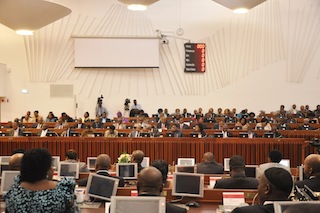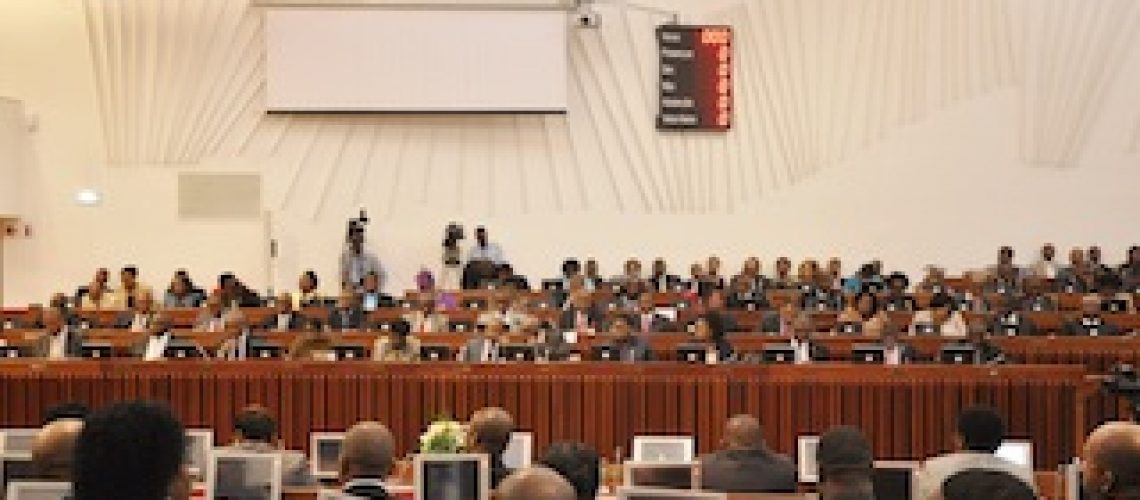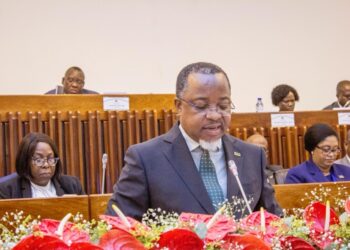 On 8 December, the majority Mozambique Liberation Front (Frelimo) bench approved the National Assembly’s action plan and budget for 2016, but the 59 Mozambique National Resistance (Renamo) Members of Parliament (MPs) abstained and their 11 Mozambique Democratic Movement (MDM) counterparts voted against. Once again, the dictatorship of the vote reigned supreme and everything was approved without the opposition’s nod, meaning that it is just an “ornamental” presence in Parliament.
On 8 December, the majority Mozambique Liberation Front (Frelimo) bench approved the National Assembly’s action plan and budget for 2016, but the 59 Mozambique National Resistance (Renamo) Members of Parliament (MPs) abstained and their 11 Mozambique Democratic Movement (MDM) counterparts voted against. Once again, the dictatorship of the vote reigned supreme and everything was approved without the opposition’s nod, meaning that it is just an “ornamental” presence in Parliament.
In 2016, the National Assembly will operate with 1,280,538,954.87 meticais [about 24,425m US dollars], as opposed to 1,304,208,310.00 meticais [about 24,873m US dollars] in 2015, to carry out the same actions that have been implemented, and others which for budgetary and other reasons have not been achieved.
In that context, Renamo explained that it abstained because “there is no transparency in the use of the fund that is approved on an yearly basis, and there has been no compliance” with the National Assembly’s yearly action plans, and no one should fold one’s arms in the face of that situation.
Also according to Renamo, there were plans involving large sums of money to built parliamentary city but nothing exists on the ground as yet. There is talk about setting up a computer system in the National Assembly, with voting done manually and no MP has a computer allocated by Parliament for its work. The panels on the MPs’ tables are useless and purely ornamental.
In the newly approved programme with 119 votes from the ruling party, the National Assembly seeks to strengthen the role of MPs as the citizen’s legitimate representatives, to consolidate its institutional position as the highest-ranking legislative organ in the country, to strengthen political control over th! e actions of government, to guarantee institutional development, and to strengthen relations among institutions and international cooperation.
According to the Standing Commission, those objectives represent the five pillars of the 2013-2022 Strategic Plan, namely “representation of citizens; legislative output; verification of government actions; institutional development; and institutional relations as well as international cooperation.”
Of the above mentioned 1,280,538,954.87 meticais, 1,256,151,339.31 [about 24m US dollars] will be disbursed by the state and the remaining 24,387,625.56 meticais [about 466,235.00 US dollars] from external financing, including 151,672.18 [about 2,900 US dollars] for salaries and remunerations.
Frelimo stressed that it voted in favour of the programme and its budget because it is responsible for guaranteeing the operation of democratically constituted institutions, and the National Assembly must fulfil its legislative and verification duties, adding that the people’s representatives must hav! e the means to assure contact with the population in electoral circles (…) [punctuation as published].
MDM said that it voted against because the programme put together by the Standing Commission fails to create conditions to promote inclusion and openness, thereby allowing the three benches to participate actively in National Assembly work without discrimination.
MDM further stressed that “there is no mechanism to settle the problem of systematic and continued exclusion experienced by our party,” which neither elevates nor renders Parliament an inclusive organ providing for political participation and reconciliation. What is more, the National Assembly action plan does not allow it to become a stage for discussing ideas designed to settle the country’s problems, or to “renew the hopes of Mozambican citizens.”


